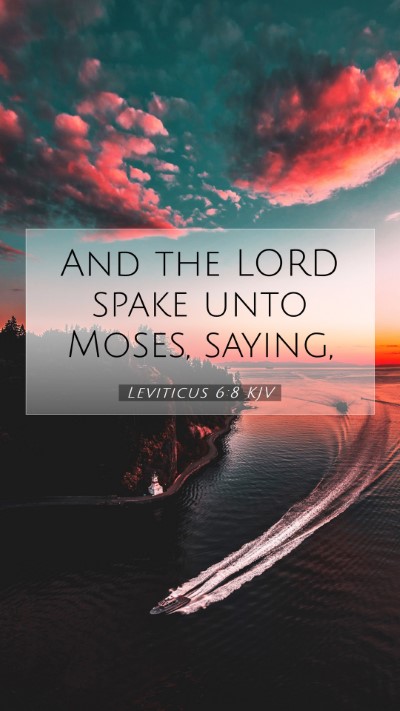Bible Verse Commentary on Leviticus 6:8
Leviticus 6:8 states: “And the Lord spake unto Moses, saying,” which serves as an introduction to a series of laws concerning offerings, particularly the procedure for the burnt offerings. This verse is significant as it emphasizes the authority and the communication from God to Moses, setting a tone of divine command and governance.
Understanding the Context
This verse falls within the broader context of the sacrificial system established in the Mosaic Law. It’s crucial to understand the role of burnt offerings as both a means of worship and atonement. Interpretation of this verse requires an exploration of the sacrificial laws that govern the Israelite community.
- Historical Background: The sacrificial system was integral for atonement and a way to maintain a covenant relationship between Israel and God.
- Authorities Involved: Moses, as the mediator, receives instruction directly from God, underscoring the importance of prophetic communication in the Old Testament.
- Subsequent Verses: The following scriptures detail the specifics of the offerings, revealing God's meticulous standards for worship.
Bible Verse Meanings and Interpretations
The directive in Leviticus 6:8 is layered with meanings that encompass obedience, respect for divine instruction, and acknowledgment of God's holiness.
- Moses as a Leader: Moses is seen as the faithful servant who conveys God's commands to the people, demonstrating the importance of leadership in spiritual matters.
- Divine Communication: The phrase "the Lord spake unto Moses" signifies how God actively engages with His people through appointed leaders.
- Implications for Worship: This verse lays the foundation for understanding worship order and the significance of sacrifices in a covenant relationship.
Insights from Public Domain Commentaries
Matthew Henry: Henry emphasizes that this command signifies God’s desire for His people to adhere to prescribed worship practices. The specificity of the instructions reflects God's holiness and the seriousness with which His laws should be regarded.
Albert Barnes: Barnes observes that these instructions initiate a larger discussion on the nature of offerings, suggesting a structured approach to worship and community life among the Israelites. He points out that Moses’ role is key in communicating God's will to the people.
Adam Clarke: Clarke notes the importance of attention to divine instruction in worship, asserting that the obedience to these commands is a reflection of reverence toward God. He connects this to the broader biblical narrative about how God's directions lead to blessings for His people.
Application to Modern Life
The principles found in Leviticus 6:8 still resonate today, offering insights into how individuals and communities should approach worship and obedience to divine guidance.
- Obedience to Divine Command: Just as the Israelites were called to follow God's laws, modern believers are encouraged to seek and follow God's leading in their lives.
- Value of Community Worship: The structure of worship established in this passage emphasizes the importance of gathering as a community to practice faith together.
- Role of Leaders: Promotes the idea that church leaders should faithfully communicate God's word, acting as mediators between God and the congregation.
Conclusion
Leviticus 6:8 holds a foundational role in understanding the nature of worship and obedience among God's people. By examining this verse, we gain insights into the discipline required in worship and the significance of divine communication through appointed leaders. This verse serves as a reminder for believers today to respect and obey God's instructions as they study Scripture and apply its teachings in daily life.
Related Bible Cross References
- Exodus 20:1-17 - The Ten Commandments as a foundation for moral guidance.
- Numbers 15:1-31 - Further instructions on offerings and priests' duties.
- Hebrews 9:22 - Discussion on the significance of blood in the sacrificial system.


